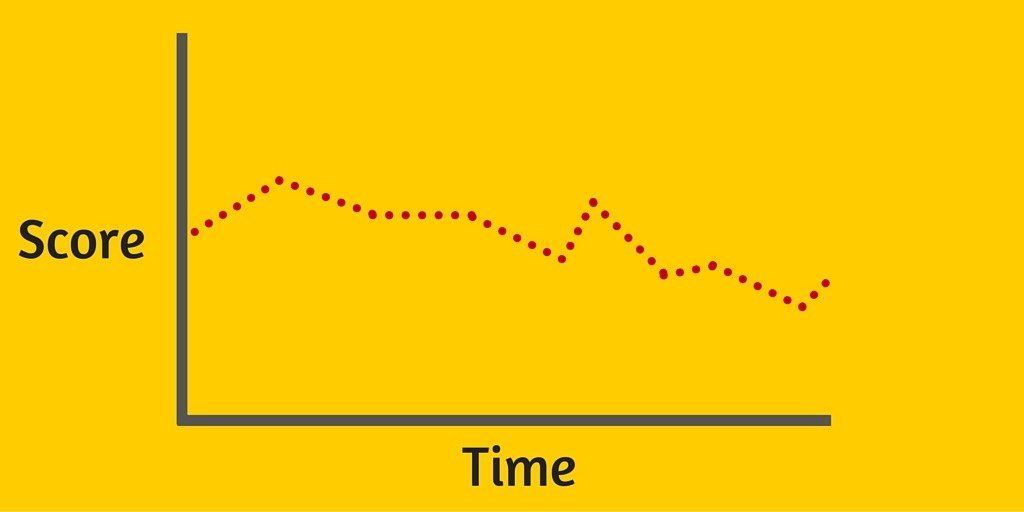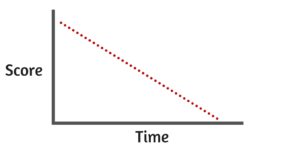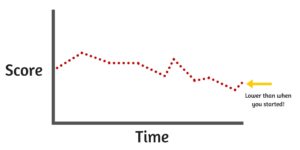
If you don’t manage your expectations properly in golf, then you most likely will not enjoy this game. Worse, you probably won’t see any improvement in your golf scores either.
I’m sad to admit it, but for a good 5-6 years I really didn’t enjoy playing golf, and it largely had to do with unrealistic expectations. The combination of not practicing enough, thinking I could shoot better scores than I was capable of, and not even playing that much made my time on the course largely unenjoyable.
Expectations are everything in golf, and explaining them is one of the cornerstones of my book.
I wanted to write an article that tries to simplify what your expectations should be based on the amount of time you have available, and help you figure out realistic goals.
I’m going to break things down in the most basic form so that a wide range of golfers can take something away from this article.
All of this will be centered on time.
Why? Because time is the most precious resource on this Earth, and is certainly the most important thing for golf scores. If you want to get to a certain level of play, time is going to be your biggest limiting factor. This will greatly influence what your expectations should be.
A lot of people argue about the best way to lower scores for a golfer. However, most of these debates forget to talk about what kind of time it’s going to take to get there. I feel this is the missing piece of the puzzle, and probably the most important one.
Adding 20-30 yards to your drives and becoming more proficient with your irons is going to lead to dramatic drops in scoring.
There’s just one small issue. For most players that takes a tremendous amount of time to get there.
So let’s go through three scenarios, all based on time:
Scenario #1: You have very little to almost no time to practice, or play much
I’m going to place a large bet that a lot of you reading this fall into this category.
You work a full time job. You might be married with kids. As much as you would like for golf to be a focal point of your life, it’s just not. It probably won’t be until you retire.

If this is you, I am going to advise you to set little to no expectations for your golf scores, and here’s why.
If you can’t play or practice much, you won’t have much to build on every time you go out to the golf course. Playing a round in April, and then your next one in late May without picking up a club much in between means that literally anything is possible when you get out on the course (good or bad).
Do not ruin your precious time when you do get that opportunity, just try and have fun. I wouldn’t even blame you if you didn’t keep score.
Some people might find that notion crazy, but unless you were a golfing savant at one point in your life, it’s almost impossible to improve at golf with very infrequent practice or play.
Your only goal should be to have fun, don’t worry about improving because it’s just not realistic.
Scenario #2: You can play on average once a week, and can devote a few hours of practice
This is also another category that a majority of golfers will fall into. You might have a Sunday group that plays once a week like clockwork, and somewhere during your week you can carve out 2-4 hours for some practice time.
If you are in this group, I would say that there can be a reasonable expectation of improvement if you spend that time wisely. Playing once a week is enough to build a bit of momentum, and see progress over time. Don’t get too ahead of yourself though!
If this is the type of time you can commit, I would not expect huge jumps in scoring ability. If you are starting the year at a 20 handicap, maybe your goal is to finish at a 17 or 18. That might not sound like a lot, and it’s possible you can exceed that goal. However, if you go in thinking that you will get all the way down to a 10, you will likely stunt your progress because your expectations are way out of line.
Progress in golf occurs in small steps. You make small breakthroughs, and then maybe you have a setback or two. But if you can keep practicing and playing a decent amount you will see small incremental progress that will build over time.
Most of us would love for this to happen, but it’s very rare for a sudden drop in your golf scores after any kind of “eureka” moment.
Most people envision their path to lower scores to look like this:

But in reality, it’s more like this if you can only practice a little bit, and play at most once a week:

So if this is you, here is my recommendation to try and shave a few strokes off your game.
- Increase the amount of time you spend practicing with your wedges and putter. You can make quick gains in scoring with your short game. This means as much as 50% of your practice time.
- Do not worry about your full swing that much. With the amount of time you have, you are not going to make dramatic strides in ball-striking ability. Work on your tempo, figure out your impact tendencies, but do not make constant changes to your swing. For the most part you’ll work with what you’ve got, and that’s OK. You can still reach your goals without changing your swing dramatically.
- Focus on your strategy on the golf course. There are definitely 2-3 strokes waiting to come off your scores because you are making mental mistakes and being too aggressive. Check out my book on course management, I will send you a free copy (link).
A lot of golfers fall into this category in terms of the amount of time they can dedicate to their games. I believe if you can focus your time on where you can impact the most amount of change (mental game/strategy & short game) you will see results rather quickly.
Many players fall into the trap of expecting too much of themselves with these kinds of time restraints, and it’s why their scores never change.
Scenario #3: I have the time; I want to see how low my golf scores can become!
The last scenario is probably what most of you would love to be doing, having the time and desire to really lower your golf scores.
If you are in this final category you have time to practice almost every day, and can play as much as 2-4 times a week. This is the amount of time that is going to be necessary to make huge strides in scoring ability.
At this point you know that golf is a relatively difficult game. If you want to get to the top of the mountain it’s going to take a lot of time and effort. There is simply no shortcut around this.
I talk a lot about improving your short game on my site because I know most people reading my articles fall into category #2.
However, if you really want to get better, and drop 5-10 strokes off your golf scores or even more….you are going to have to become much better at ball striking and improve your swing. There’s just no way around it.
That’s not to say you should abandon the short game. You still need to be very good at scrambling to lower your scores quite a bit. Golfers who are in the single-digit handicap range still miss roughly half their greens during a round, which means they are faced with having to get up and down for par 8-9 times.
I can’t tell you how to become a better ball striker because it’s complicated and unique to every individual. Honing a golf swing to hit the ball farther with more accuracy takes a lot of hard work. It is a calculated effort.
If you are really serious about improving your golf swing I would suggest working with a qualified teaching professional. They can accelerate your progress by evaluating your current swing, and giving you a plan on how to reasonably fix it.
Then you are going to have to practice…a lot.
I go through some extremes to work on my ball striking, and I try to hit balls almost every day. I know it’s the only way I can continue to play at my level, and improve. It is just part of the deal.
On top of practicing, you need to play golf quite a bit too. You need to be on the course dealing with the pressures of a live round. I believe this is where most learning takes place because practice can only take you so far.
Making huge jumps in golf scores is a complete package. It’s mental game, strategy, practice, and playing. All of them need to be heading in the right direction if you want to reach the mountaintop.
The reality is all of them require a great deal of time to improve. If you have that time, by all means go for it. See if you can go from a 15 handicap down to a 4. It will be a long journey with a lot of twists and turns, but if you reach your goal it will feel amazing.
Just don’t fool yourself into thinking you can do it playing infrequently, and not practicing much.
That is the truth.
So take a look at these three categories. See which one you fall into in terms of the amount of time you can dedicate to golf. There may be some exceptions, but I would advise adjusting your expectations based on how much time you have to practice and play.
We care about the protection of your data Read our Privacy Policy